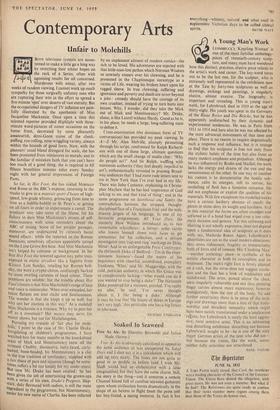Contemporary Arts
Unfair to Molehills
BOTH television systems are accus- tomed to make a little go a long way by stretching their whiter hopes on
the rack of a Series, often with
iaafrcA agonising results for all concerned.
Murderous with ennui, after two weeks of random viewing, I cannot work Up much sympathy for those surgically unfunny men who are rupturing, their wits in the effort to spread a five-minute 'spot' over deserts of vast eternity. But the occupational dangers of TV inflation are pain- fully illustrated by the apotheosis of Miss Jacqueline Mackenzie. Once upon a time this talented reporter provided Highlight with three- minute word-pictures of minor occasions on the home front, decorated by some pleasantly amateurish, demi-Goon mime of the cheek- puffing, eye-rolling, nose-wriggling variety, always within the bounds of good form. Now, with the planners' usual bland disregard for scale, she has teen promoted from miniatures to murals; and in the familiar if mistaken faith that you can't have too much of a good thing, she is required to fill fifteen breathless minutes solus every Sunday night with her general impressions of Foreign Parts.
So far, in Hot Foot, she has visited Morocco and Rome at the BBC's expense, returning to the studio to give us a mauvais quart d'heure of high- speed, low-grade whimsy, grimacing from time to time as a htibble-bubble or St. Peter's, or gettiog on all fours in order to impersonate a camel. The producer may take sonic of the blame, for his failure to dam Miss Mackenzie's stream of self- consciousness with. some reminders 'about the ABC of timing. Some of her purpler passages, moreover, are underscored by curiously banal sound effects: while she reported on the Roman fountains, somebody offscreen apparently turned on the Lime Grove fire hose. And Miss Mackenzie isn't helped by costume or background. In her first Hot Foot she towered against tiny palm trees, exposed in exotic dcicollete like a fugitive from Kismet. Last Sunday, retailing her Roman holi- day, she wore a crypto-chiton, confusingly backed by some swirling cartoons of local colour. These problems are soluble; but the trouble about Hot Foot's future is that Miss Mackenzie's range of face and voice is minuscular. When over-extended, her talent flattens out into cliché and facetiousness. The wonder is that she keeps it up so well; but Why test her stamina in this way? As a molehill Miss Mackenzie is a treasure. Why try to pass her off as a mountain? Her inoues may serve for motor shows, but not for Michelangelos.
Pursuing my crusade of 'fair play for mole- hills,' I point to the case of Mr. Charlie Drake. Invigilating at children's programmes, I haye watched him for many months in the knockabout team of Mick and Montmorency (now off the screens). Chubby, diminutive, baby4aced, curly- haired, bone-headesl, his Montmorency is a clot in the true tradition of tomfoolery, stipplied with a fair share of pain and injustice (though he some limes suffers 'a bit too keenly for my under-sixes): But now Mr. Drake has been exalted : he has been given the job of entertaining the grown-ups with a series of his own, Drake's Progress. Slap- stick, duly flavoured With sadism, is still the main ingredientin the programme, but Montmorency, under his new name of Charlie, has been infected
by an unpleasant ailment of modern comics—the itch to be loved. His adventures are injected with that little-man-lost pathos which Norman Wisdom so unwisely smears over his clowning, and he is presented in the Chaplinesque stereotype as a victim of Life, wearing his broken heart upon his ragged sleeve. In true clowning, suffering and ignorance and poverty and death are never beyond a joke : comedy should have the courage of its own cruelties, instead of trying to turn butts into heroes. Why, I wonder, did they take the Mick out of Mick and Montmorency? Mr. Drake, alone, is like Laurel without Hardy. Good as he is, in his place, he needs a large, long-suffering mate 'to define it.
Cross-examination (the dominant form of TV conversation) has provided my peak viewing. In A—Z Mr. Alan Melville, plumply pirouetting through his script, confronted Sir Ralph Richard- son with one of those large, ultimate questions which are the small change of studio chat: 'Why do people act?' And Sir Ralph, waffling with numinous authority ('they feel deeply impelled to act'), enthusiastically revealed in praising Broad- way audiences that '1 had more rude letters sent to me in New York than I've ever had in my life.' There was John Custance, explaining to Christo- pher Mayhew that he has had 'experience of God talking to me and that kind of thing': and in the same programme on Sainthood and Sanity -the contradiction between. the stripped, thought- disciplined face of a Franciscan friar and the, stale, evasive jargon of his language. In one of my favourite programmes, All Your Own, the masterly Huw Weldon introduced • us, to two remarkable schoolboys : a forme; polio victim who lowers himself down rock faces to. get ammonites for his collection, and a private investigator into 'cup-and-ring' markings on Ilkley Moor.' And in an tinforgettable Press Conference. the thirteenth Duke of Bedford—'l'm in the enter- tainment business'—faced the sneers of his inquisitors With cheerful, uninhibited, exemrilary frankness. 'What,' said Mr. Muggeridge, with the cold,.patrician authority in which His Grace was so conspicuously lack ing---'what would you do if you wanted to stop being a duke?' The thirteenth Duke pondered for a moment, puzzled. `I've really no idea,' he said, 'I've never thought about it. I like being a duke.' Although it may be true that 'the future of dukes in Europe isn't very high,' this Nrticularone has a big future in television.
RICHARD FINDLATER


































 Previous page
Previous page